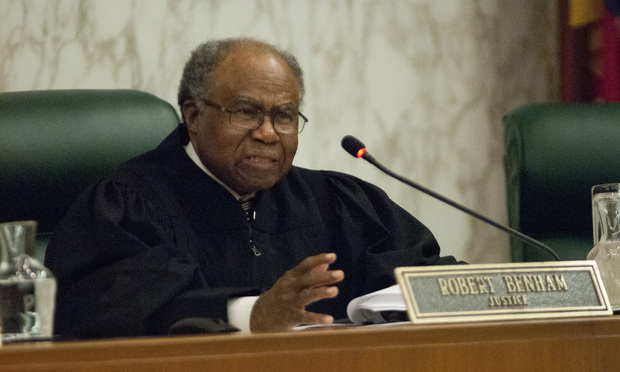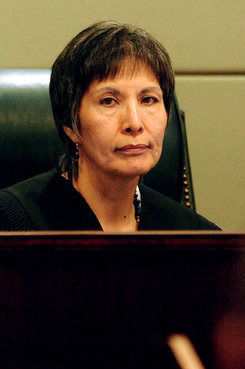State Supreme Court Restores Immunity to Judge Sued Over Troubled Court
The Georgia Supreme Court reversed the state Court of Appeals and restored judicial immunity to the former chief judge of DeKalb County Recorder's Court, which was abolished three years ago.
September 10, 2018 at 02:34 PM
5 minute read
 Justice Robert Benham, Supreme Court of Georgia (Photo: John Disney/ ALM)
Justice Robert Benham, Supreme Court of Georgia (Photo: John Disney/ ALM)
The former chief judge who presided over DeKalb County Recorder's Court until the Georgia General Assembly abolished it, has absolute judicial immunity from civil litigation stemming from the defunct court's troubled operations, the state Supreme Court ruled Monday.
“The United States Supreme Court has long recognized the doctrine of judicial immunity which shields judges from being sued and from being held civilly liable for damages based on federal law as a result of carrying out their judicial duties,” Justice Robert Benham said in the unanimous ruling.
And, he concluded, “A judge is not deprived of judicial immunity simply because she has allegedly acted mistakenly, maliciously or corruptly.”
 Judge Nelly Withers, DeKalb County Recorders Court (Photo: Johnny Crawford/AJC)
Judge Nelly Withers, DeKalb County Recorders Court (Photo: Johnny Crawford/AJC)The 11-page ruling reverses the Georgia Court of Appeals, which stripped former Chief Judge Nelly Withers and her recorder's court administrator, Troy Thompson, of judicial and official immunity last year after they were sued by former defendant Bobby Schroeder. Schroeder had appeared in recorder's court and paid a fine after being cited for a traffic violation.
Schroeder was arrested, jailed, and lost his job after court personnel erroneously notified the state Department of Driver Services that he missed his court appearance and never paid the ticket
In an unusual twist, two appellate court judges—Chief Judge Stephen Dillard and Judge Amanda Mercier—sat in for Justices Carol Hunstein and Nels Peterson when the high court heard oral arguments last year.
An appeals court panel that included Judges Christopher McFadden, Lisa Branch—now a judge on the U.S. Court of Appeals for the Eleventh Circuit—and Charles Bethel, last year reversed a DeKalb County judge, who threw out civil rights claims after determining Withers and her court administrator were protected by judicial immunity.
McFadden's opinion held that, while judicial immunity may shield judges from lawsuits stemming from actions they perform in their judicial capacity, it does not extend to administrative actions such as supervising court employees and overseeing the efficient operation of a court.
The appellate panel was also persuaded by Schroeder's then-counsel, David Ates, who argued that, because Withers and Thompson were negligent in executing specific administrative duties, they were not immune from liability. Ates died shortly after the opinion was handed down, and Schroeder is now represented by Harlan Miller and Gerard Lupa.
Attorney Thomas Mitchell of Carothers & Mitchell in Buford, who defended Withers and Thompson before the Supreme Court, said his clients “are certainly pleased with the court's ruling” because it places Georgia's judicial immunity policies back in line with other states and courts across the country. He praised the court for saying in a footnote, “It is ultra-important in our democracy to preserve the doctrine of judicial immunity” so that judges can exercise “untrammeled determination without apprehension of subsequent damage suits.”
“It's also a good result for all the judges and court administrators across the state of Georgia for whom the Court of Appeals decision had created some consternation,” he said.
Miller could not be reached for comment.
Withers' court was the target of a string of lawsuits questioning its operations before it was abolished three years ago, including allegations it was illegally adjudicating cases over which it had no jurisdiction.
When the Legislature created four new state court judgeships in 2015 to handle traffic citations and ordinance violations that had been the purview of Recorders Court, Withers was not appointed to fill one of the posts.
The case attracted the attention—and alarm—of the state councils of superior court, state court and municipal court judges which all filed friend-of-the-court briefs backing Withers.
Benham's ruling noted that a judge can only be stripped of the protections of judicial immunity by “committing an act that is non-judicial in nature” or taking judicial action without having jurisdiction to do so.
“In this case, there is no contention that [Withers and Thompson] were acting in the absence of all jurisdiction because, at the time, traffic offenses like the one at bar were adjudicated in the DeKalb County Recorder's Court,” Benham said.
“Courts have held that the act of reporting the disposition of a matter pending before a court to an interested government agency is a function that is judicial in nature and inherent to the judicial process.”
This content has been archived. It is available through our partners, LexisNexis® and Bloomberg Law.
To view this content, please continue to their sites.
Not a Lexis Subscriber?
Subscribe Now
Not a Bloomberg Law Subscriber?
Subscribe Now
NOT FOR REPRINT
© 2025 ALM Global, LLC, All Rights Reserved. Request academic re-use from www.copyright.com. All other uses, submit a request to [email protected]. For more information visit Asset & Logo Licensing.
You Might Like
View All
Georgia's Governor Details Spending Plans but Not His Top Priority of Lawsuit Reform
6 minute read
Fourth Circuit Seeks More Legal Briefs in Unresolved N.C. Supreme Court Election
4 minute read
Fulton DA Seeks to Overturn Her Disqualification From Trump Georgia Election Case
3 minute readTrending Stories
- 1'A Death Sentence for TikTok'?: Litigators and Experts Weigh Impact of Potential Ban on Creators and Data Privacy
- 2Bribery Case Against Former Lt. Gov. Brian Benjamin Is Dropped
- 3‘Extremely Disturbing’: AI Firms Face Class Action by ‘Taskers’ Exposed to Traumatic Content
- 4State Appeals Court Revives BraunHagey Lawsuit Alleging $4.2M Unlawful Wire to China
- 5Invoking Trump, AG Bonta Reminds Lawyers of Duties to Noncitizens in Plea Dealing
Who Got The Work
J. Brugh Lower of Gibbons has entered an appearance for industrial equipment supplier Devco Corporation in a pending trademark infringement lawsuit. The suit, accusing the defendant of selling knock-off Graco products, was filed Dec. 18 in New Jersey District Court by Rivkin Radler on behalf of Graco Inc. and Graco Minnesota. The case, assigned to U.S. District Judge Zahid N. Quraishi, is 3:24-cv-11294, Graco Inc. et al v. Devco Corporation.
Who Got The Work
Rebecca Maller-Stein and Kent A. Yalowitz of Arnold & Porter Kaye Scholer have entered their appearances for Hanaco Venture Capital and its executives, Lior Prosor and David Frankel, in a pending securities lawsuit. The action, filed on Dec. 24 in New York Southern District Court by Zell, Aron & Co. on behalf of Goldeneye Advisors, accuses the defendants of negligently and fraudulently managing the plaintiff's $1 million investment. The case, assigned to U.S. District Judge Vernon S. Broderick, is 1:24-cv-09918, Goldeneye Advisors, LLC v. Hanaco Venture Capital, Ltd. et al.
Who Got The Work
Attorneys from A&O Shearman has stepped in as defense counsel for Toronto-Dominion Bank and other defendants in a pending securities class action. The suit, filed Dec. 11 in New York Southern District Court by Bleichmar Fonti & Auld, accuses the defendants of concealing the bank's 'pervasive' deficiencies in regards to its compliance with the Bank Secrecy Act and the quality of its anti-money laundering controls. The case, assigned to U.S. District Judge Arun Subramanian, is 1:24-cv-09445, Gonzalez v. The Toronto-Dominion Bank et al.
Who Got The Work
Crown Castle International, a Pennsylvania company providing shared communications infrastructure, has turned to Luke D. Wolf of Gordon Rees Scully Mansukhani to fend off a pending breach-of-contract lawsuit. The court action, filed Nov. 25 in Michigan Eastern District Court by Hooper Hathaway PC on behalf of The Town Residences LLC, accuses Crown Castle of failing to transfer approximately $30,000 in utility payments from T-Mobile in breach of a roof-top lease and assignment agreement. The case, assigned to U.S. District Judge Susan K. Declercq, is 2:24-cv-13131, The Town Residences LLC v. T-Mobile US, Inc. et al.
Who Got The Work
Wilfred P. Coronato and Daniel M. Schwartz of McCarter & English have stepped in as defense counsel to Electrolux Home Products Inc. in a pending product liability lawsuit. The court action, filed Nov. 26 in New York Eastern District Court by Poulos Lopiccolo PC and Nagel Rice LLP on behalf of David Stern, alleges that the defendant's refrigerators’ drawers and shelving repeatedly break and fall apart within months after purchase. The case, assigned to U.S. District Judge Joan M. Azrack, is 2:24-cv-08204, Stern v. Electrolux Home Products, Inc.
Featured Firms
Law Offices of Gary Martin Hays & Associates, P.C.
(470) 294-1674
Law Offices of Mark E. Salomone
(857) 444-6468
Smith & Hassler
(713) 739-1250







